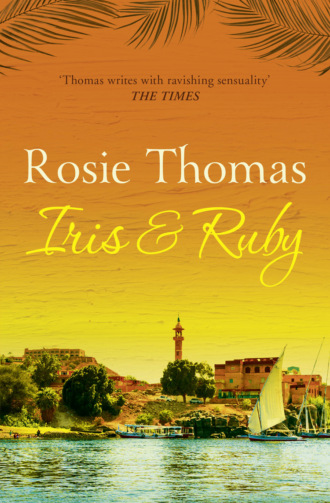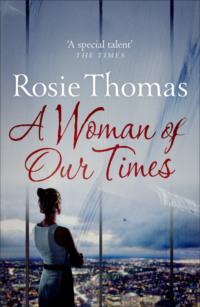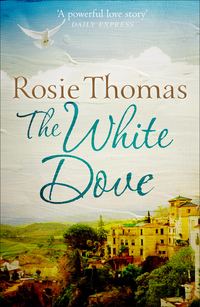
Полная версия
Iris and Ruby: A gripping, exotic historical novel
Faria yawned. ‘Oh dear. I completely forgot to tell the poet we were leaving. Whatever will he think?’
It wasn’t a question that required an answer. Jeremy – known as the poet – was the most fervent of Faria’s admirers, a thin and mournful young man who worked for the British Council. Ali was away and Jeremy had been her escort for the evening. He would think what he presumably always thought: that the exquisite and careless Faria had given him the slip again.
Sandy had passed out. I could hear the breath catching thickly in the back of his throat. Whisky fumes and Faria’s perfume mingled with the smell of leather and the uniquely Cairene stink of kerosene and incense and animal dung. Faria took a Turkish cigarette out of her bag, clicked her gold lighter and inhaled deeply. I shook my head when she held it out to me. The pain in my ankle was intense and the faint nausea it engendered made my senses keener. I let every turn of the route print itself in my mind, the black silhouette of each dome against the fractionally paler sky, the hooked profile of an old beggar patiently sitting on a step. Every detail was significant and precious. I wanted to absorb each tiny impression and hold it and keep it, because tonight was so important. I never doubted that.
We stopped near the embassy gates and shook Sandy awake. He groaned again and muttered incoherently as he flopped out into the road. The car swept on. Over the top of the embassy building, behind the flagpole with the limp folds of the Union flag, I could see the tops of huge trees shading lawns where I had been paraded for tea parties as a child. I liked to slip away and gaze at the Nile beyond, slow olive-green, flagged with the sails of feluccas.
Later I lay in bed with the wooden shutters latched open and watched the sky. My bandaged ankle throbbed but I didn’t mind that it kept me awake. All I could think of was Xan, whom Faria had hardly noticed and who had left me stricken with desire from the moment I saw him. Shivers of laughter and longing and anticipation ran through me as I lay there, slick with sweat, under my thin cotton sheet. On that first sleepless night I never doubted that Xan and I would meet again. I would tell him I wasn’t and never had been Sandy Allardyce’s girl, and we would claim each other. That was exactly how it was meant to be.
How simple, how innocent it seems. And how joyful.
Garden City was set beside the Nile, an enclave of curving streets with tall cocoa-brown and dirty cream houses and apartment blocks deep in gardens of thick, dusty greenery. Our apartment belonged to Faria’s parents who lived in a grand house nearby. There were wood-block floors and heavy furniture, and every room had a ceiling fan that lazily circulated the scalding air. There were big metal-finned radiators too, that occasionally emitted hollow clanking noises and dribbled rusty water. Faria never noticed the heat and her black hair stayed like a glossy wing instead of frizzing in the humid blast as mine did, but she was afraid of feeling cold. When she was going out at night she always slipped a little bolero of white feathers or a silk velvet cape over her bare shoulders.
My room was a narrow, high-ceilinged box at the end of a corridor away from the main part of the flat. The furniture was on a humbler scale and there was a view from the window of a jacaranda tree in the next-door garden. I didn’t know Faria and Sarah very well but they were lively company, and I was pleased to have such a comfortable place to live. It was even conveniently close to where I worked, at British Army GHQ, just off Sharia Qasr el Aini. I was clerical and administrative assistant to a lieutenant-colonel in Intelligence called Roderick Boyce, known to everyone as Roddy Boy. Colonel Boyce and my father belonged to the same London club and had hunted together before the war. A letter from my father, and an interview during which my prospective boss reminisced about my father taking a fence on his big bay mare, were enough to gain me the job.
The morning after Xan and I met I got up early to go to work, as I had done on every ordinary day since I had come back to Cairo.
In the stifling mid afternoons the streets cowered under the hammer blow of the sun out of a white sky, but at 8 a.m. it was cool enough to walk the few streets between the flat and the office. That day, with my heavily bandaged ankle, I had to take a taxi. Roddy Boy looked at me as I half hopped to my desk, supported by a walking stick belonging to Faria’s father.
‘Oh dear. Tennis? Camel racing? Or something more strenuous?’
‘Dancing,’ I replied.
‘Ah. Of course.’ Roddy Boy chose to believe that my social life was much more hectic and glamorous than it really was. ‘But I hope your injury will not impede your typing?’
‘Not at all,’ I said. I rolled a sandwich of requisition forms and carbon paper into my machine and forced myself to concentrate.
When at last I came home again Mamdooh, the suffragi who looked after us and the apartment, greeted me in his stately way: ‘Good afternoon, Miss Iris. These were delivered for you an hour ago.’
‘Oh, beautiful.’
There was a big bunch of white lilies, gardenias and tuberoses. I buried my face in the cool blooms. The intense perfume brought back last night even more vividly, candlelight and music and cigars and Xan’s face. Mamdooh beamed. He was pleased for me; usually the bouquets were for Sarah.
I sat down awkwardly and opened the envelope that came with them. There was a plain white card with the words I hope your ankle will mend soon. It was signed simply X. That was all.
Mamdooh was still standing there in his white galabiyeh, waiting for more. Faria complained that he was too familiar and that what time she came in at night was none of his business, but I liked the big man and his broad smiles that were always accompanied by a shrewd glance. Mamdooh missed nothing. Faria’s mother was probably aware of that too.
‘Just from a friend,’ I said.
‘Of course, Miss. I will put in water for you.’
The flat often looked like a florist’s shop. Sarah and Faria didn’t even ask who my bouquet was from.
I admired my flowers and waited, but a week and then another went by. The whole month of June 1941 crawled past and I heard nothing more from Xan.
In my outer office at GHQ I typed reports and delivered signals for Roddy Boy, and chatted to the staff officers who hurried in and out to see him. As a civilian I was on the lowest level of clearance, but because of my family I was judged to be safe and many of the secret plans that flew in and out of Roddy Boy’s office crossed my desk first.
The Allied troops, except for those besieged in Tobruk, had withdrawn into Egypt and the Germans were at the Libyan border. In an attempt to dislodge them, in a brief flurry of GHQ activity during which Roddy Boy didn’t withdraw for his usual long afternoon at the Turf Club, Operation Battleaxe was launched.
‘We can’t match their bloody firepower,’ Roddy groaned from behind his desk.
Almost one hundred of our armoured tanks were lost to German anti-tank guns, their smouldering wrecks lying abandoned in a thick pall of dust and smoke. Many of their crews were dead or wounded.
As July approached I began accepting every invitation that came my way. I went to cocktail parties and tennis tournaments, fancy dress balls, and poetry readings at the British Council, scanning the crowds for a glimpse of Xan. I sat beside the pool at the Gezira Club every lunchtime, always in the hope of hearing news of him.
Just once, I met one of the other officers who had been at his table at Lady Gibson Pasha’s party.
‘Xan?’ he said vaguely. ‘I don’t know. Doesn’t seem to be around, does he?’
He had simply vanished, and Jessie James with him. My certainty about us ebbed away. Maybe he had been posted elsewhere. Maybe he was married. Maybe – could that be possible? – he really did prefer other diversions.
Maybe he was dead.
I kept my fears to myself. What I felt seemed too significant and also too equivocal, too fragile, to share with Faria and Sarah.
‘You’re very sociable these days,’ Faria said with a raised eyebrow.
‘It’s as easy to go out as to stay in.’ I shrugged.
Then, at the end of the first week of July, on an evening when the heat made it an effort to dress to go out, even to move, the telephone rang in the hallway and I heard Mamdooh answer it. His big round head appeared in the doorway.
‘For you, Miss.’
‘Hello?’ I said into the receiver.
‘This is Xan,’ he said. ‘May I come and see you?’
I laid my head against the door frame, electric shocks of relief and delight chasing up my spine. I managed to answer, ‘Yes. Now?’
‘Right now.’
‘Yes,’ I said again. ‘Yes, please come.’
That was how it was.
I open my eyes on the dim, silent room. There is spilt tea on the cushions, some sticky drops dark on my front. I am overwhelmed with sleep now, too tired to sit up and tidy myself. It doesn’t matter. Who will see, except Mamdooh and Auntie?
Sleep. Dream. Always the dreams.
Shit. Double shit and fuck, Ruby said to herself as she caught a glimpse of what lay beyond the doors. Is this what it’s like?
It was dark outside. Beyond a barrier there was a heaving wall of heads and waving arms and shouting faces, harshly lit and shadowed by sickly overhead neon lights. The airport was clammily air-conditioned, but she could already feel the heat rolling towards her through the doors as they slid open and hissed shut again. The crowd of arriving passengers pushed her forward, catching her rucksack with the protruberances of their own baggage, jerking her from side to side. The doors opened once more and this time she was part of the gout of humanity they disgorged.
Hot, humid air rushed into her lungs. Sweat immediately prickled under her arms and in her hairline.
A chorus of yelling rose around her. Hands grabbed at her arms, tried to hoist the pack off her back.
‘Lady! Taxi, very good, cheap.’
‘Hotel, lady. Nice hotel.’
‘Stop it,’ Ruby shouted. ‘Leave me alone.’ She hadn’t bargained for this onslaught. Alarmed, she wrenched herself free of the clutching hands but another dozen pairs replaced them, tried to propel her in different directions.
‘Taxi here! Lady, I show you.’
She became aware of a stream of honking cars beyond the immediate crowd, a fringe of palm trees with ragged leaves outlined against a sky dimly peppered with stars, a snake of headlights along an elevated road. The noise and the heat were overwhelming. Ruby glared into the boiling sea of dark faces, moustaches, open mouths. At the back of the throng was a younger face, imploringly watching her.
She dragged an arm free, pointed at him.
‘You. Taxi?’
Instantly he dived through the scrum of bodies, grabbed her wrist with one hand and snatched her rucksack with the other. Ruby kept her smaller nylon sack tightly pressed to her side. They scuttled through the mass together and emerged into a clearer space beyond.
‘Come,’ the man shouted, pointing over the roofs of a hundred hooting black-and-white taxis. A packed bus roared in front of them, missing them by inches.
The driver’s taxi was parked under one of the palm trees. Two ragged children were sitting propped against it. The driver gave them a coin, threw her rucksack into the boot and opened the passenger door. With relief Ruby sank into the back seat. The springs had collapsed and stained foam padding bulged through a split in the brown plastic seat cover. The interior of the car smelled strongly of cigarettes and cheap air freshener.
The driver thrust the car into gear and they roared forward, then jerked to an almost immediate halt in a queue for the exit road. Even though it was dark, the heat was intense. Ruby had never encountered this phenomenon before. She closed her eyes, noticing that even her eyelids were sticky with sweat, then forced them open again. She mustn’t switch off, not yet. The driver flashed her a smile over his shoulder. His teeth were cartoon-white in his brown face. He did look young, not much older than herself.
‘Where you go?’
She unfolded the sheet of paper that she had kept in her jeans pocket all through the flight and read out the address.
‘Why you go there? I know nice hotel, very clean, cheap. I take you there instead.’
‘We’re going where I told you,’ Ruby insisted. ‘No arguing. Got that?’
This amused him. He laughed and slapped his hands on the steering wheel.
The traffic began to move. There were roads everywhere, the sodium-lit elevated sections crazily perched over complex intersections, all hemmed in by drab concrete tower blocks and hung about with giant advertisement hoardings. The faces of huge women with black eyebrows and cows’ eyelashes mooned at each other over the street lamps. Every foot of road was clogged with hooting cars and trucks and big blue buses. The road signs were written in a code of squiggles and dots.
Ruby lounged in the sagging seat and stared at it all. Her face was expressionless but inwardly she was fighting to maintain the defiance that had buoyed her up since leaving home. Now that she was actually here, she realised that she had hardly considered her destination. To get away and to stay away, that was what she had fixed on. But now all kinds of other problems reared up, competing with each other for her attention. She didn’t know how to handle this place, not at all. And nobody knew where she was; no one was looking out for her arrival. It was far from the first time in her life that she had been in the same situation, but never in quite such an alien setting.
She felt a long way from home, but she bundled up that thought and pushed it aside.
‘How much?’ she demanded. She had changed the rest of her money into Egyptian pounds at the airport exchange. It made a reassuringly thick wad, which was why she had decided to splash out on a taxi. The thought of trying to find a bus had been too much to contemplate.
The driver swung the wheel to overtake a donkey cart laden with saucepans and tin bowls that was plodding along the inner lane of the motorway. He shot the smile at her again.
‘Ah, money, no broblem. Where you from?’
‘London.’
‘Very nice place. David Beckham.’
‘Yeah. Or no. Whatever.’ At least they were moving now, presumably towards the city centre, wherever that might be. Airports were always miles away in the outer bloody suburbs, weren’t they?
‘My name Nafouz.’
‘Right.’
There was a pause. Nafouz reached under the dash and produced a pack of Marlboro, half turned to offer it to her. Ruby hesitated. She had run out and she was longing for one.
‘Thanks.’ She lit it with her own Bic, ignoring his.
‘You have boyfriend in Cairo?’
Ruby gave a snort of derisive laughter. ‘I’ve never been here in my life.’
‘I be your boyfriend.’
She had hardly looked at him, except to notice his teeth, but now she saw the creases in the collar of his white shirt, and the way the inside of his black leather jacket dirtied the fabric in crooked ribs. His black hair was long, combed back from his face. Quite nice, really.
She lifted her head. This, at least, was familiar territory. ‘In. Your. Dreams,’ she said clearly.
Nafouz’s delighted laughter filled the car. He drummed his hands on the wheel as if this was the funniest joke he had ever heard.
‘I dream always. Dreaming cheap. Cost nothing at all.’
‘Just watch the road, all right?’
She huddled in her corner, smoking and looking out at the wilderness. She had been abroad before, of course, with Lesley and Andrew to places like Tuscany and Kos and the Loire valley (how dull that one had been), but she had never seen anything like this steaming mess of concrete and metal. As they got nearer to what must be the middle of the city the traffic jam got even worse. There were long stationary intervals during which she peered down the side streets. There were tiny open-fronted shops with men sitting smoking at tin tables. Shafts of light came out of open doorways, shining on women with black shawls over their heads who sat on stone steps with children squirming around them. There were crates of globular shiny vegetables and crooked towers of coke cans, a thick litter of rubbish in the gutters, scrawny dogs nosing at it all. Men selling things from trays yelled on the street corners, other bent old men pushed hand barrows through the traffic. Neon lights blinked everywhere and there was the endless honking of horns.
‘Busy place,’ she said at last, wanting to make it smaller and less threatening with a casual phrase.
Nafouz shrugged. ‘Who your friends here?’
He was either being nosy, or he was concerned for her. Neither was welcome.
‘Family,’ she said discouragingly.
They were winding down smaller streets now, leaving the main thoroughfares behind. Ruby glanced upwards and saw onion domes and tall thin towers pasted against dark-blue sky. The street was so narrow that there was only room for one car to pass. The women sitting on their steps lifted their heads and stared as the taxi slid by. There was one great dome just ahead, cutting an arc of sky, and a trio of thin spires that rose beside it.
Nafouz stopped when he could go no further. The street had become a cobbled alley and it took a sharp-angled turn just in front of them. A stone pillar blocked the way. In the angle of a pale blank wall was a door with a small flight of stone steps leading up to it.
‘Here is place,’ Nafouz announced.
Ruby stared at the door. She could just see that it was painted blue, old paint that had bubbled to expose wood split by the sun. She hadn’t at all worked out what to expect, but it wasn’t this. There was nothing here to give any clue to what or who might be inside.
She summoned up her resolve.
‘Yeah. How much money d’you want?’ She opened up her nylon sack and her Discman and headphones and an apple and tubes of make-up rolled over the seat.
‘Fifty bounds.’
‘Fifty? D’you think I’m stupid or something? I’ll give you twenty.’ She opened her wallet and fumbled with torn filthy notes.
‘From airport, fifty.’ Nafouz wasn’t smiling any longer.
‘Get lost, right?’ Ruby gathered up her belongings and hopped out of the car but the driver was quicker. He ran round and held down the boot so she couldn’t retrieve her rucksack. They squared up to each other, faces inches apart.
‘Twenty-five,’ Ruby said.
‘Fifty.’
‘Give me my fucking bag.’ She kicked his shin as hard as she could. Unfortunately she was only wearing flipflops.
Nafouz yelped. ‘Lady, lady. You are not behaving nicely.’
‘Really? Now hand over my bag.’
‘You pay first.’ But Nafouz was relenting. This tourist’s resistance earned a glimmer of his respect. Usually they just gave in and handed over the money. ‘Thirty,’ he conceded.
‘Fuck’s sake.’ But she sighed and took another note out of her purse, crumpling it and flinging it against the sleeve of his leather jacket. Nafouz’s smile was restored. Thirty Egyptian pounds was the going rate for a ride in from the airport.
Ruby took her rucksack and hoisted it over her shoulder. With the wires of her headphones trailing and the contents of her other bag spilling in her arms she marched up the stone steps without a backward glance. She heard Nafouz reversing the car the way they had come, then a squeal of tyres as he raced away.
As soon as he was gone she regretted the loss of even this brief relationship. Maybe she should have asked him to wait. What if there was nobody here? What if the address was wrong? Where would she go, in this city where she couldn’t even read the street signs?
Then she lifted her head and straightened her shoulders again.
There was no door knocker, nothing. She knocked on the blistered paint. There was a smell of dried piss in this alleyway, competing with all the other stinks.
There was no sound from within.
Ruby clenched her fist and hammered even harder. Some poem that they had all been made to learn at school floated into her head and, without thinking, she yelled the words in time to the banging: ‘“Is there anybody there,” said the Traveller?’
The door suddenly creaked open, revealing a six-inch slice of dim light. Ruby was so startled that her voice trailed away in a squeak. She could just see a big fat man in a white dress.
She said, ‘I am Ruby Sawyer.’
Having taken one look at her, the man was already trying to close the door again. Ruby’s foot flew out and wedged itself in the crack. She wished for the second time that she was wearing proper shoes. She repeated her name, louder this time, but it clearly wasn’t enough.
She added loudly, ‘I am here to see my grandmother. Let me in, please.’
The resistance diminished a little. Immediately she put her shoulder to the door and pushed hard. It swung open and she fell inwards with a clatter of spilled belongings. The man’s face was a dark purplish moon of disapproval. He frowned, but he did help her to her feet.
Ruby looked around. Her first impression was of the inside of a church. There was a stone floor, musty wood panelling, a pale, weak light suspended on chains inside a glass vessel. A smell of incense, too, and some kind of spicy cooking.
‘Madam is resting,’ the man said frigidly.
The best course was obviously to be conciliatory.
‘I don’t want to disturb her. Or disturb anyone. I’m sorry if I made a noise. But, you know …’ The man didn’t help her out. He went on impassively staring at her. ‘I … I have come all the way from London. My mother, you see … Um, my mother is Madam’s daughter. You know?’
There was another silence. Whether he knew or not, the connection didn’t seem to impress him. But at last he sighed heavily and said, ‘Follow me, please. Leave this here.’ He pointed to her bags. She relinquished them with pleasure.
He led the way beneath an arch and through a bare room. Behind a heavy door there was a flight of enclosed wooden stairs. The lights were very dim, just single bulbs in the angles of walls, shaded with metal grilles. They went up the stairs and along a panelled corridor. It was a big house, Ruby thought, but it was dusty and bare, and all the stairs and corners and screens made it secretive. A place of shadow and whispers. It was much cooler in here than it was outside. A faint shiver twitched her skin.
The man stopped at a closed door. He bent his head and listened. She noticed that his face had turned soft and concerned. There was no sound, so he lifted a latch and eased the door open. There was a light burning in a teardrop of crimson glass, a carved divan seat piled with cushions under a shuttered window. In a low cushioned chair with a padded footstool a very old woman was propped up with her eyes closed. A spilled glass lay on the kelim rug.
Ruby took a step forward and she opened her eyes.
Dream? Someone I used to know who was buried beneath the sand while I was looking elsewhere?
I am afraid of these spectres who loom up out of the past. I fear them because I can’t place them …
Fear makes me angry.
‘Mamdooh, who is this? What do you think you are doing? Don’t let people walk in here as if it’s a public library. Go away.’
The woman, apparition, whoever she is, doesn’t move.
Mamdooh kneels down, picks up the glass, puts it back on the tray. I can see the blotches on his old, bald skull. At once I feel sorry, and confused. I put my hand out to him and it’s shaking. ‘Forgive me. Who is she?’
The woman – very young, strange-looking – comes closer.
‘I’m Ruby.’
‘Who?’
‘Your granddaughter. Lesley’s daughter.’
‘You are not.’
Lesley’s daughter? A memory disinters itself. A pale, rather podgy child, dressed in a wool kilt and hairslides. Silent, yet somehow mutinous. Have I got that right?









